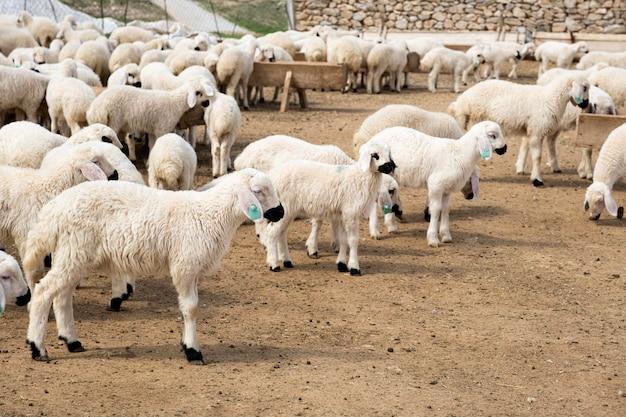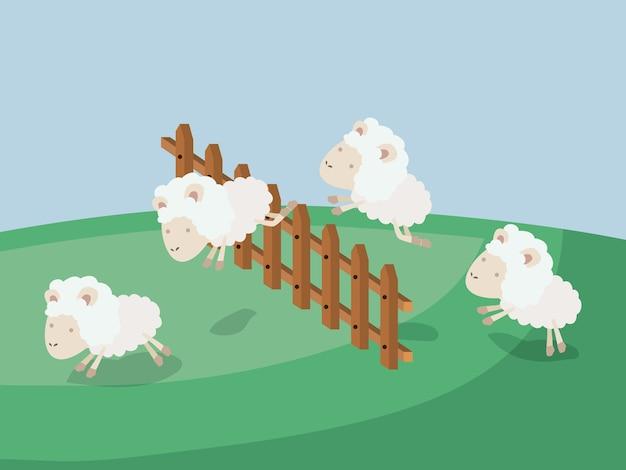Have you ever wondered why we say “sheep” and not “sheeps,” or why the plural for “fox” is “foxes” and not “foxen”? The English language is full of peculiarities when it comes to forming plurals, and it can be quite confusing at times. In this blog post, we will delve into the world of plural nouns and explore some common examples that often trip people up. So, whether you’re curious about why we say “sheep” instead of “sheeps,” or just want to brush up on your grammar knowledge, keep reading!
Throughout this article, we will address various questions regarding plurals, such as the plural of “boy” (it’s “boys,” not “boies”), the plural of “food,” and even whether it’s correct to say “sheeps.” We’ll also touch on the plurals of animals like tigers and foxes and explore some interesting cases, like the plural of “army” and “brush.” So, let’s dive in and unravel the mysteries of plural nouns in English!
Join us in this journey through the fascinating world of plurals, where we’ll explain the rules, exceptions, and peculiarities that make English such an intriguing language. By the end of this blog post, you’ll have a clearer understanding of plurals and be better equipped to navigate the nuances of English grammar. So, let’s get started and explore the correct usage of plurals in everyday speech!

Is it Correct to Say “Sheeps”?
In the world of grammar and language, there are certain peculiarities that can leave even the most seasoned wordsmith scratching their head. And one such question that often crops up is whether it’s correct to say “sheeps” instead of “sheep.” So, let’s dive into this woolly confusion and unravel the truth behind it!
Singular or Plural: A Grammar Gang’s Conundrum
In standard English, “sheep” is one of those special nouns that doesn’t change when you’re talking about more than one. That’s right, folks! Whether you’re admiring one fluffy sheep or a flock of them grazing in the meadow, the word remains the same. So, it’s “one sheep” and “many sheep.”
The Case of Mistaken Identity: X Marks the Spot
Now, we humans have this funny tendency to add an “s” to the end of words to make them plural. But when it comes to “sheep,” this rule simply doesn’t apply. So, if someone says “sheeps,” they’re not adopting a secret sheep language. In fact, they’re just making a common mistake and adding one too many “s”es.
The Grammar Police’s Verdict: Sheep Shall Remain Sheep
If you’re ever tempted to say “sheeps” to describe a group of these fluffy creatures, think again! It’s always best to stick with “sheep” both in the singular and plural form. So, the next time you find yourself in the company of these enchanting animals, marvel at their beauty and remember to use the right word!
Alternative Words: Flock and Herd
But what if you want to talk about more than one sheep without saying “sheep” over and over again? Fear not, for the English language has a solution! Instead of using “sheep” as the plural form, you can utilize words such as “flock” or “herd.” So, you could say “a flock of sheep” or “a herd of sheep” to add variety to your sentences.
Wrapping Up: The Sheepy Saga
In the thrilling world of language, grammar rules can sometimes complicate even the simplest concepts. But fear not, dear language enthusiasts! Remember that “sheep” is both the singular and plural form, and “sheeps” is merely a linguistic misstep. So, let’s embrace the beauty of these woolly creatures and continue to weave our linguistic excellence with the right words!
In conclusion, it is not correct to say “sheeps.” Stick to using “sheep” for both the singular and plural form and impress your friends with your grammatical prowess. Happy shepherding, folks!
(Note: This blog post was brought to you by the Grammar Gang, where language mastery and sheep-spotting know-how collide.)

FAQ: Is it correct to say “sheeps”?
As an avid language enthusiast, I love exploring the intricacies of grammar and dissecting language quirks. One of the common questions that often arises is the plural form of certain words. Today, we’ll dive into the fascinating world of plurals, and specifically address the query of whether it is correct to say “sheeps.” So, let’s get started!
Why Isn’t the Plural of “Boy” “Boies”
Ah, the plural of “boy.” It may seem logical to assume that adding an “s” to the end would do the trick, right? However, English loves to stir things up, and “boys” is the agreed-upon plural form. So, next time you see a group of young lads playing around, just remember it’s “boys” and not “boies.”
What Is the Plural for “Food”
When it comes to sustenance, you might notice that we often use the term “food” in both the singular and plural form. Yes, that’s right! Much like air or water, food transcends the need for a plural distinction. So grab a plate, sit back, and enjoy the culinary delights in all their singular or plural glory!
What Is a Plural Animal
Animals, those fascinating creatures that share our beautiful planet, have their own set of plural forms. Now, you might be wondering what exactly is a “plural animal”? Well, fear not! It simply means referring to more than one animal. So, whether it’s a herd of elephants, a pride of lions, or a flock of birds, just remember to use their respective plural forms. It’s as easy as herding cats!
Is It Correct to Say “Fishes”
Ah, the age-old question of “fish” versus “fishes.” In regular usage, we generally refer to multiple fish as… you guessed it, “fish.” However, there are instances where “fishes” does make an appearance. When different species of fish are being discussed or when referring to multiple groups of fish, “fishes” takes the stage. So, next time you go fishing, you’ll know whether to proudly exclaim, “Look at all the fish!” or “Look at all the fishes!”
What Is the Plural of “Tiger”
The mighty tiger, a symbol of power and grace. So, what do we call multiple members of this majestic feline species? Well, just like many other nouns, the plural form of “tiger” is “tigers.” So, whether you encounter one tiger or a whole pack of them (though you might want to tread carefully in that situation), “tigers” is the way to go!
What Is the Plural of “Army”
When it comes to armies, be they the heroic troops defending a nation or a group of enthusiastic ants parading along, the plural is simply “armies.” So, the next time you find yourself surrounded by multiple groups of disciplined soldiers or tiny, organized insects, remember to salute those “armies” with admiration!
What Is the Plural of “Brush”
Now, let’s talk about those trusty tools we use to keep our hair tidy or paint magnificent works of art. We refer to multiple brushes simply as “brushes.” So, whether you’re an artist with an arsenal of brushes or just someone who enjoys a well-groomed mane and owns various brushes for different purposes, rest assured that “brushes” will always be there to keep things plural!
What Is the Plural of “Boy”
Ah, the plural form of “boy.” It’s a straightforward one! When referring to a group of young gentlemen, we use the term “boys.” So, next time you see a troupe of lads playing around, you can confidently say, “Look at those boys having the time of their lives!”
Why Is “Sheep” Its Own Plural
Ah, the enigma that is “sheep.” When it comes to this fluffy quadruped, the plural is… “sheep”! That’s right, my friend, “sheep” is its own plural form! So, whether you encounter a single sheep grazing peacefully or a whole flock of them jumping joyfully, you can safely refer to them as “sheep” without needing a plural makeover.
Can We Use Two Plural Words in a Sentence
Absolutely! English is a wonderfully flexible language that allows us to combine multiple plural nouns in a single sentence. Let your creativity flow and feel free to use as many plural words as you desire. Whether it’s “books,” “dogs,” “trees,” or even “sheep,” English embraces the plural world with open arms. So, go ahead and craft those sentences that dazzle with a multitude of plurals!
What Is a Plural in Grammar
In grammar, a plural refers to the form of a word that indicates more than one entity. It is the linguistic equivalent of a high-five to indicate that there’s more than meets the eye. Plurals come in different forms, be it adding an “s” or “es,” modifying vowels, or even completely changing the word itself. So, the next time you encounter a group of things, remember to celebrate their plurality with the correct grammar.
What Is the Plural of “Bird”
Ah, those feathered friends that bring joy to nature enthusiasts and birdwatchers alike. The plural form of “bird” is simply “birds.” So, whether you’re marveling at a lone bird soaring through the sky or a flock of them gracefully dancing from tree to tree, you can happily exclaim, “Look at all those beautiful birds!”
Is It Correct to Say “Sheeps”
Alas, my friend, “sheeps” is not a word you’ll find in the realm of correct grammar. As we mentioned earlier, “sheep” stands strong as its own plural form. So, resist the temptation to add an “s” to that fluffy creature. Instead, revel in the simplicity of saying “sheep” regardless of whether there’s one or a hundred grazing in the meadow.
What Is the Plural of “Fox”
Ah, the clever and cunning fox, a creature of myths and tales. When referring to more than one of these sly fellows, we simply say “foxes.” So, whether you see one fox sneaking through the underbrush or a pair of foxes engaged in a playful game, remember to appreciate these adorable creatures as “foxes” – no tricks required!
In conclusion, the plural forms of words can be an amusing and often surprising aspect of language. From the straightforward “boys” and “birds” to the peculiar “sheep” that navigates the world with its own plural, English continues to delight us with its linguistic twists and turns. So, embrace the quirks, embrace the plurals, and let the true beauty of language unfold before you. Happy pluralizing, folks!
